In this post: Learn why falsos amigos can be tricky words for English speakers and avoid using them in the wrong context.
At Llamitas Spanish we are passionate about language acquisition. We love digging deep into the nuances of the Spanish language.
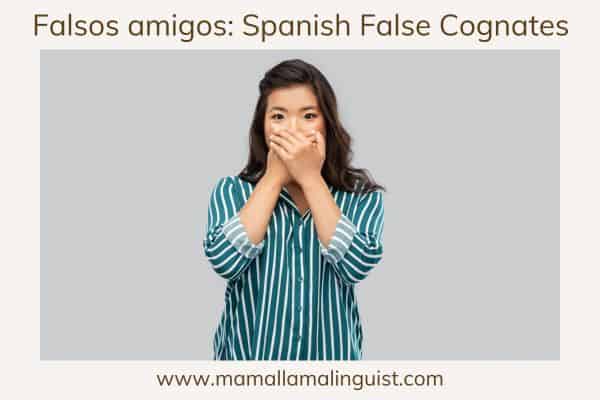
Whether that’s exploring the intricacies of the grammar rules, learning some unique Spanish idioms or practicing pronunciation with fun adivinanzas (riddles). There’s always something new to discover when learning a new language!
Related post: How to Roll you r in Spanish
One of those interesting concepts is understanding falsos amigos. Being tricked by words called falsos amigos can happen even when you’ve been learning Spanish for years.
Throughout this post, you’d see that some Spanish words aren’t what they seem so you can be more aware and use them in the right context.
What are falsos amigos (false friends)?
Despite the name, the term falsos amigos (false friends) has nothing to do with friendships despite the name. Quite the irony for what the term actually means. It refers to words or phrases in Spanish that look and sound similar to English words but in reality, have a very different meaning.
They are also referred to as ‘false cognates’. A cognate is a word that looks and sounds the same in 2 different languages because they share the same origin. This happens with English and Spanish because they share the same Latin or Greek root with similar spelling and meaning. We see this with words such as ‘hospital’, ‘cereal’ and ‘horrible’.
It’s so important to understand false friends because using them incorrectly totally changes the meaning of what you’re attempting to say. One of the most common uses of false friends is the word ‘embarazada’.
Estoy embarazada = I’m pregnant NOT I’m embarrassed!
Imagine the horror of confusing the two in conversation.
Common False Cognates in Spanish
Here’s a list of common false cognates so you can be more aware of how you use them and what they actually mean if you come across them in your lessons and readings.
| Spanish word | Looks like | Actual meaning | Example |
| embarazada | embarrassed | pregnant | Mi tía está embarazada. My aunt is pregnant. |
| sensible | sensible | sensitive | Stephanie es una persona sensible. Stephanie is a sensitive person. |
| molestar | molest | to bother/annoy | Su hermano le molesta mucho. Her brother annoys her a lot. |
| educado | educated | polite | Carlos es muy educado. Carlos is very polite. |
| carpeta | carpet | folder/file | Tengo una carpeta roja. I have a red folder/file. |
| en absoluto | absolutely | not at all | ¿Te gustan las manzanas? No, en absoluto. Do you like apples? No, not at all. |
| pie | pie | foot | Me duele el pie. My foot hurts. |
| sopa | soap | soup | La sopa es deliciosa. The soup is delicious. |
| cuestión | question | issue | Necesito ayuda con esta cuestión. I need help with this issue. |
| librería | library | bookstore | Quiero ir a la librería. I want to go to the bookstore. |
If you’re an English speaker, it’s natural for your brain to quickly associate false cognates in Spanish with the English words you’ve known and have been using all your life.
It takes some getting used to at first so encourage your kids to review these words often and add to the list as they come across more on their own. They can also place them on flashcards to assist with learning.
Spanish Curriculum for the Early Years
If you want your kids to experience the joy of bilingualism and the advantages of learning a second language, it helps to start as early as you can. We offer a series of Llamitas Spanish curricula levels that are helpful, fun and easy to use.
Our programs adopt a thematic approach to teaching for optimal results and meaningful learning. They’re also designed to cater to different levels of learning and lifestyles including support for dual-language families, bilingual homeschool education and facilitating lessons on your own.
Related post: How to Add a Foreign Language to Your Homeschooling
We offer:
- Llamitas Spanish Morning Binder: A preschool binder that offers a gentle introduction to first concepts in Spanish for ages 2 – 6.
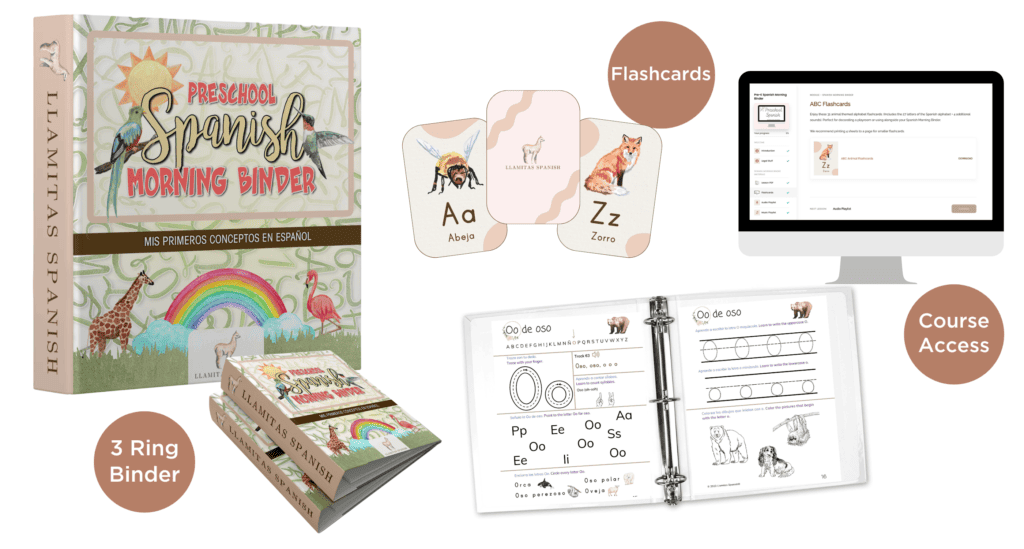
- Level 1 Llamitas Spanish Curriculum: A beautifully illustrated thematic curriculum rooted in the Hispanic culture for Pre-K and Kindergarten
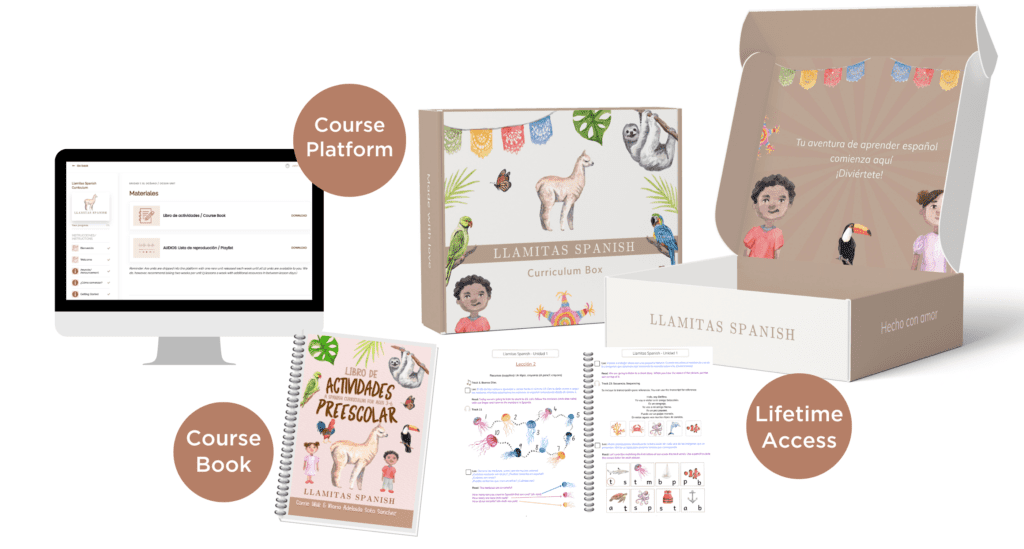
- Level 2 Curriculum: Perfect for continued learning for lower elementary grades.
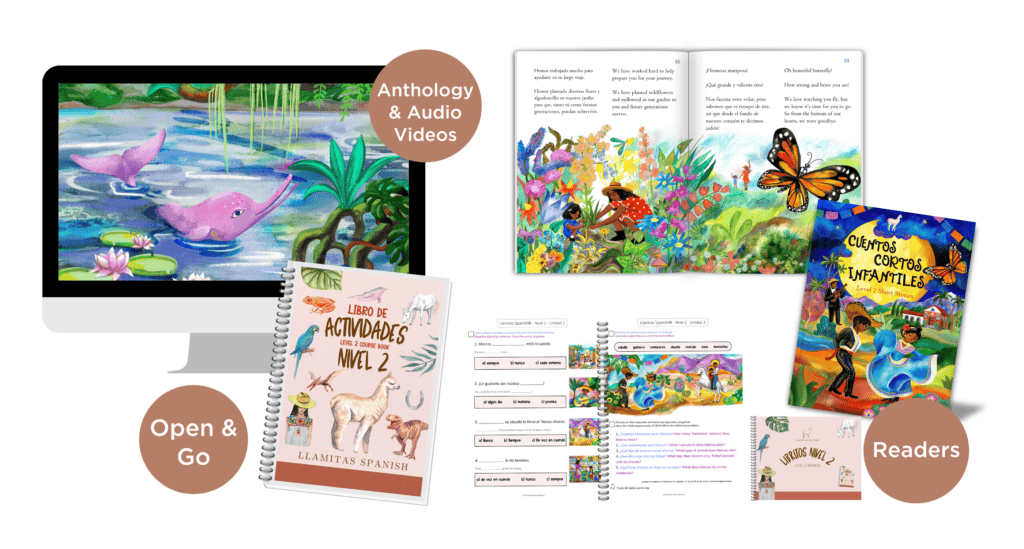
Level 3 Curriculum: Perfect for continued learning for lower elementary grades.
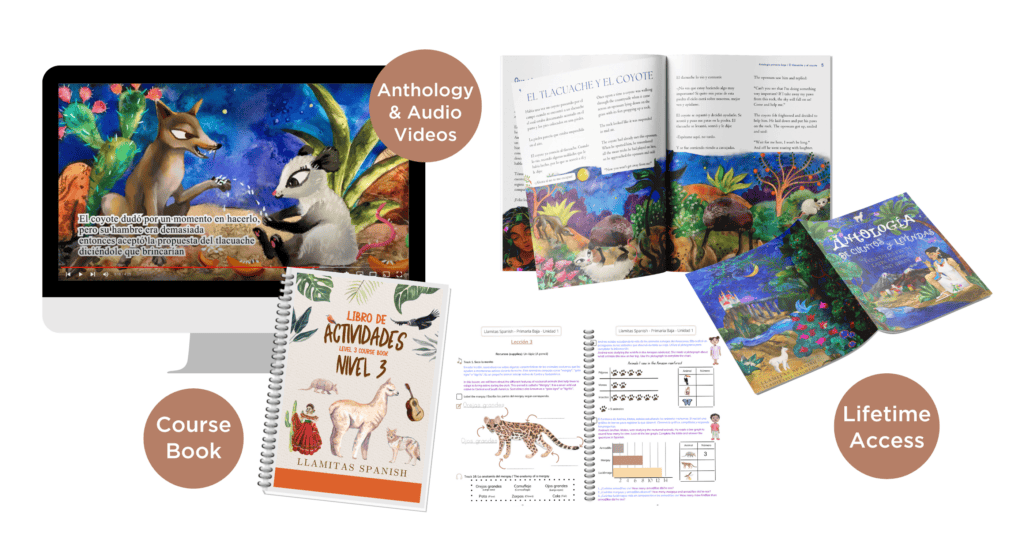
We’ve also got a number of FREE resources that you can use to introduce Spanish to your kids or supplement other lessons.
Head over to our curriculum shop to see what’s in store.
